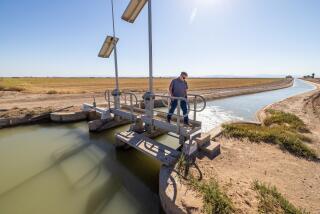Water Reform for Central Valley
Regarding your July 27 editorial counseling caution on congressional action to scrap the Central Valley Project Improvement Act, âLet the Water Wars Cool Offâ:
A recent delegation to Washington to testify on the CVP amendments proposed in HR 1906 was composed of nine of Californiaâs largest urban water agencies--north and south. Members of this coalition supply water to two-thirds of the stateâs population and to businesses and industries that generate three-fourths of the stateâs economy. We are united in our commitment to maintaining last Decemberâs bay-delta accord, which brought together urban, agricultural and environmental interests as well as federal and state regulators. The CVPIA is integral to the success of the bay-delta accord, which provides for the temporary operation of the stateâs largest water source, paving the way for long-term solutions.
As you say, problems with the CVPIA--and there are a few--could be dealt with through administrative modifications. But if Congress chooses to change the law legislatively, then we cannot support HR 1906 as introduced. Amendments to the bill are necessary to protect the spirit of the consensus-based process that respects the legitimate concerns of urban, agricultural and environmental interests.
JOHN R. WODRASKA
General Manager, MWD
Los Angeles
* The Times is right. California can no longer afford another waging of the water wars. This is precisely the reason why changes in the CVPIA are crucial.
The current move to reform the CVPIA, is not, by any means, an effort to âscrapâ the thrust of the 1992 law. Despite the good intentions of former President Bush and countless others, the reality is that the supposed benefits are not yet realized. Up to this point, several sections of the act have provided no substantive environmental improvements and, instead, are punitive against the water users paying the bill.
Of all issues, restoration of long-term water contracts receive the most criticism. Perhaps it is important to remember that the water rights belong to the water users, not to the United States. Under the CVPIA, water users are held under the gun of contract renegotiations, not knowing whether they will receive a renewal. In the interim, they are doled two- or three-year âshort-ermâ contracts that provide no financial security, nor any guarantees.
Under such a system, financial planning is virtually impossible. Restructuring the act to provide for more certainty and consistency in contract renewals would benefit the interest of not only agriculture, but cities and the state as a whole.
ROGER W. ROBB, Engineer-Manager
Lower Tule River Irrigation District
Woodville, Calif.
More to Read
Sign up for Essential California
The most important California stories and recommendations in your inbox every morning.
You may occasionally receive promotional content from the Los Angeles Times.










